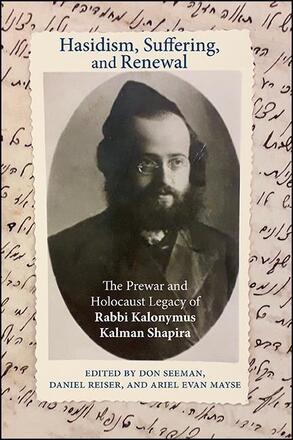
Hasidism, Suffering, and Renewal
The Prewar and Holocaust Legacy of Rabbi Kalonymus Kalman Shapira
Alternative formats available from:
Reconsiders the legacy of an important Hasidic mystic, leader, and educator who confronted the dilemmas of modernity after World War I and whose writing constitutes a unique testimony to religious experience and its rupture in the Warsaw Ghetto.
Description
Kalonymus Kalman Shapira (1889–1943) was a remarkable Hasidic mystic, leader, and educator. He confronted the secularization and dislocation of Polish Jews after World War I, the failure of the traditional educational system, and the devastation of the Holocaust, in which he lost all his close family and eventually his own life. Thanks to a new critical edition of his Warsaw Ghetto sermons, scholars have begun to reassess the relationship between Shapira's literary and educational attainments, his prewar mysticism, and his Holocaust experience, and to reexamine the question of faith—or its collapse—in the Warsaw Ghetto. This interdisciplinary volume, the first such work devoted to a twentieth-century Hasidic leader, integrates social and intellectual history along with theological, literary, and anthropological analyses of Shapira's legacy. It raises theoretical and methodological questions related to the study of Jewish thought and mysticism, but also contributes to contemporary conversations about topics such as spiritual renewal and radical religious experience, the literature of suffering, and perhaps most pressingly, the question of faith and meaning—or their rupture—in the wake of genocide.
Don Seeman is Associate Professor in the Department of Religion and the Tam Institute for Jewish Studies at Emory University. He is the author of One People, One Blood: Ethiopian-Israelis and the Return to Judaism. Daniel Reiser is Chair of the Department of Jewish Thought at Herzog College, Israel. His books include Imagery Techniques in Modern Jewish Mysticism. Ariel Evan Mayse is Assistant Professor of Religious Studies at Stanford University. He is the author of Speaking Infinities: God and Language in the Teachings of Rabbi Dov Ber of Mezritsh.
Reviews
"…a welcome contribution to the ongoing appreciation of a remarkably creative minor tzaddik who remains a major hasidic innovator of spiritual life within and beyond unprecedented times whose critical analysis in the study of religion has only begun." — Religious Studies Review
"Hasidism, Suffering, and Renewal offers an unprecedented lens into multiple different interpretations of one remarkable man's confrontation with unspeakable evil while also exploring his broader context." — The Lehrhaus